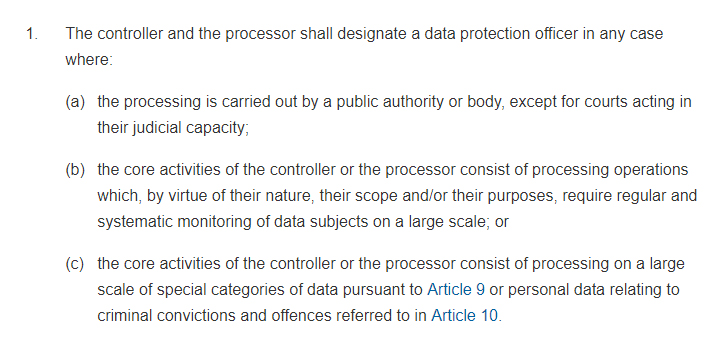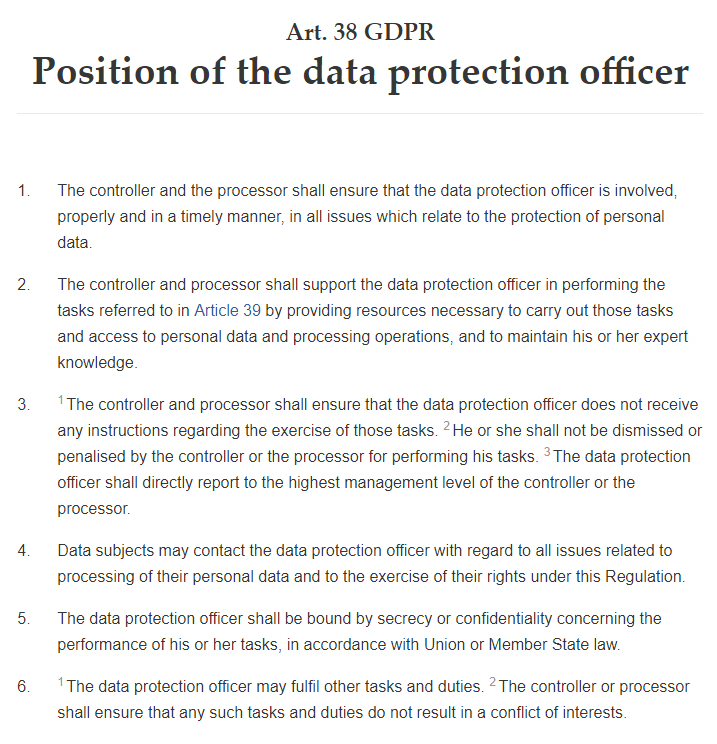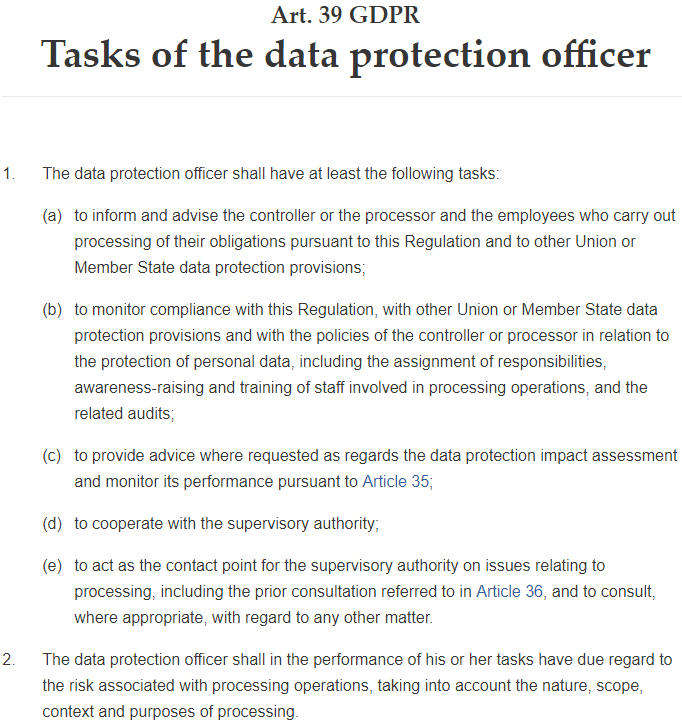About
Our easy-to-read ebook will help your business understand and navigate what it takes to be compliant with the GDPR.
On this page
- 1. EU Representatives and Data Protection Officers
- 2. When an EU Rep and DPO are Required
- 3. When an EU Member State Representative is Required
- 4. When a Data Protection Officer is Required
- 5. Could One Person Do Both Roles?
- 6. EU Representatives
- 6.1. Article 27: Representatives of Controllers or Processors Not Established in the Union
- 6.1.1. Section 2: Exceptions
- 6.1.2. Section 3: Relation of EU Rep's Residence to Your Business Dealings
- 6.1.3. Section 4: Communications
- 6.2. Article 35: Data Protection Impact Assessment
- 7. Data Protection Officers
- 7.1. Article 37: Designation of the Data Protection Officer
- 7.2. Article 38: Position of the Data Protection Officer
- 7.3. Article 39: Tasks of the Data Protection Officer
EU Representatives and Data Protection Officers
Depending on your data processing and collection methods as well as your geographical location and the location of your audience, you may be required to appoint an EU representative or Data Protection Officer.
While both of these roles are intended to improve compliance with and enforcement of the GDPR, they do so in different ways by serving different purposes for different reasons.
In this chapter, we will explore the specific requirements and obligations for these two roles to help you determine if you need to appoint an EU representative, a Data Protection Officer, both, or neither.

The purpose of an EU representative is to ensure that companies outside of the EU have a local contact for matters concerning the GDPR. This is to ease the burden of communications across continents and time zones, expediting and guaranteeing communications between foreign entities and supervisory authorities within the EU.

The purpose of a Data Protection Officer (or DPO) is to have an expert within your organization that is knowledgeable about and responsible for compliance with the GDPR.
DPOs are required for companies who process certain types or amounts of data. By appointing a Data Protection Officer, it becomes less likely that personal data will be mishandled or the laws of the GDPR will be broken.
When an EU Rep and DPO are Required
It is very possible that your company could require both an EU member state representative and a Data Protection Officer.
For this to happen, your company would need to:
- Be located outside of the EU, and
- Process or monitor a large amount of personal data or special kinds of data on a regular basis
Let's review the requirements for each to see if you need to appoint either or both.
When an EU Member State Representative is Required
An EU representative is required in the following circumstances:
- When a data controller or a data processor is located outside of the EU, and
- That data controller or data processor regularly collects or processes the personal data of residents of the EU, or
- That data controller or data processor processes special categories of data on a large scale, or
- That data controller or data processor processes personal data related to criminal histories
If these conditions are met, then an EU member state representative must be appointed within one of the countries where the data controller or data processor has users.
When a Data Protection Officer is Required
A Data Protection Officer is required in the following circumstances:
- When a public authority processes personal data
- When a data controller or data processor regularly or systematically monitors personal information on a large scale
- When a data controller or data processor handles special categories of personal information on a large scale
- When a data controller or data processor handles personal information relating to criminal history
If any of these conditions are met, a Data Protection Officer must be appointed.
Could One Person Do Both Roles?
While these two positions are different and distinct, they do share many similarities between them. Considerations for special categories of data and criminal histories are given in both cases, as well as distinctions between occasional versus regular, and large scale versus small scale data processing.
While the purpose of these two roles is different, and you could very well be required to have both, it might be theoretically possible that one person could fill both roles. But it isn't recommended and won't be practical in most cases.
Article 37 tells us that a Data Protection Officer may have other duties in addition to his or her role as a DPO. This could potentially mean that a single individual could serve as both an EU member state representative and Data Protection Officer. While theoretically this could be done, such an individual would need to be a resident of the EU while your company or organization would be located outside of the EU (or else you wouldn't need an EU rep).
This could create a contradiction for the requirement that a Data Protection Officer have easy access to the company for which they work, however. After all, it would be probably difficult for a DPO to ensure the organization they work for is complying with the GDPR when they're far away and in another country.
While there is no actual mention of this being possible or forbidden under the GDPR, it probably would not be recommended or logistically feasible in most cases, though theoretically it could be possible.
EU Representatives
Article 27 of the GDPR: Representatives of controllers or processors not established in the Union, covers the basics of when companies outside of the EU are required to appoint a member state representative.
For starters, the individual must be located within the EU and serves as a liaison for your company and the authorities of the GDPR. This is intended to improve and expedite communications which will result in less of a burden for both the authorities and affected data subjects.
If either of these parties have questions or concerns about your policies or compliance with the GDPR, they can contact a local representative rather than a company in another country or timezone. This will cut down on potentially costly communication delays and reduce lost or overlooked inquiries.
Let's look at some specifics from the GDPR to nail down why and when some businesses may need to appoint an EU representative.
Article 27: Representatives of Controllers or Processors Not Established in the Union
Article 27 makes up the core of the regulations pertaining to EU member state representatives in the GDPR.
Another important section is Article 3, which covers the territorial scope of the regulation. Article 3 states that companies both within and outside of the EU that handle the personal information of residents of the EU must be fully compliant with the GDPR.
This is very clear and is important when considering Article 27 which refers to Article 3. This reference reconfirms that data controllers and data processors who are not located within the EU are required to designate a representative who is located there.
Section 2: Exceptions
Section 2 of Article 27 describes the scenarios in which a representative is NOT needed:

The obligation laid down in paragraph 1 of this Article shall not apply to:
- processing which is occasional, does not include, on a large scale, processing of special categories of data as referred to in Article 9(1) or processing of personal data relating to criminal convictions and offences referred to in Article 10, and is unlikely to result in a risk to the rights and freedoms of natural persons, taking into account the nature, context, scope and purposes of the processing; or
- a public authority or body.
Point (a) is a lot of information to take in at once, so let's break it down.
Data controllers and data processors located outside of the EU do NOT need to appoint a representative inside the EU if they:
- Only process data occasionally,
- Do not process special categories of data on a large scale. These special categories of data include:
- Race
- Ethnicity
- Political opinions
- Religion
- Philosophical beliefs
- Trade union membership
- Genetic data
- Biometric data
- Health data
- Sexual orientation
- Sexual activity
- Do not process personal information that is related to criminal history, or
- If they only process data that comes with limited risk potential in the event of a data breach
In order to comply with the GDPR from outside of the EU, these are the requirements that will determine if you need to designate an EU representative or not.
The terms "occasionally" and "large scale" are admittedly vague, and we hope to receive more clarification on these entries in the near future to specify at what point data processing becomes more than "occasional" or the distinction between "large" and "small" scale.
For now, it's best to rely on common sense and err on the safe side if you are truly uncertain by appointing an EU representative, just in case.
Section 3: Relation of EU Rep's Residence to Your Business Dealings
Section 3 states that your EU representative must reside within one of the EU member states from where your company collects personal information. That is, your representative should be located in an area you are targeting, not just within the broad confines of the EU.

3. The representative shall be established in one of the Member States where the data subjects, whose personal data are processed in relation to the offering of goods or services to them, or whose behaviour is monitored, are.
After all, the purpose of appointing an EU representative is to make it easy for your data subjects and their supervisory authorities to contact you. Having your representative on the opposite side of the EU from the majority of your customers would not be convenient or wise.
Say, for example, that you process the personal information of citizens of the UK, France, and Italy. In that case, your EU representative should be located in one of those three countries.
If your representative was located instead in Germany, that would not be compliant because although Germany is a part of the EU, that is not one of the countries in which your data subjects reside.
Section 4: Communications
Section 4 explains that your designated EU representative should be included as a contact for supervisory authorities and users. This is so that the rep can be contacted with questions or concerns about your data processing procedures or compliance with the GDPR.

4. The representative shall be mandated by the controller or processor to be addressed in addition to or instead of the controller or the processor by, in particular, supervisory authorities and data subjects, on all issues related to processing, for the purpose of ensuring compliance with this Regulation.
This is one of the major reasons for having an EU rep, as your local representative will be a much more convenient point of contact for your data subjects and the authorities located in the Union.
Article 35: Data Protection Impact Assessment
Article 35 is another relevant section of the GDPR that describes the main functions of EU representatives. In it, data protection impact assessments are discussed, and it mentions that in some situations data controllers should call on their EU representatives for input.

9. Where appropriate, the controller shall seek the views of data subjects or their representatives on the intended processing, without prejudice to the protection of commercial or public interests or the security of processing operations.
This is important because it not only gives additional responsibility to EU reps, but it also highlights another purpose for designating an EU member state representative: having someone in your organization who is familiar with the laws, culture and pulse of a country that may be very different from your own.
Having someone located in a foreign market could provide valuable insight into how that society is similar to your own or how it might be very different.
This knowledge could be vital to foreign companies that are unfamiliar with social norms in a region that they are targeting. Language barriers, translations, differences in daily life, or even opinions on personal privacy could vary wildly between countries. This could lead to embarrassing mistakes, poor business decisions, or potentially failure to comply with the GDPR despite the best intentions.
Your EU member state representative is not only a convenient point of contact for your company in foreign markets, but a knowledgeable expert of that market that you can consult with.
As explained in Article 27 and further detailed in Article 35 of the GDPR, your EU member state representative is an appointed local contact within your foreign market.
This individual serves as an intermediary for supervisory authorities, your company, and your users. This individual is meant to ease communications between your company located outside of the Union and those you interact with within the Union.
While it may seem burdensome to keep a designated representative in the EU, the reasons for having one are certainly reasonable. This representative will also provide your company with valuable information about the local market. In addition, a local contact could be vital for time-sensitive matters that otherwise could cost your company valuable time, money, or reputation.
You may encounter aspects of the duties of Data Protection Officers that seem very similar to those of EU member state representatives, but remember that these are entirely separate entities with their own conditions and duties.
Data Protection Officers
The core guidelines and requirements for Data Protection Officers are presented in Articles 37, 38 and 39 of the GDPR.
Article 37: Designation of the Data Protection Officer
Article 37 begins with an explanation of when a Data Protection Officer is required. The circumstances for needing to appoint a Data Protection Officer are as follows:

- The controller and the processor shall designate a data protection officer in any case where:
- the processing is carried out by a public authority or body, except for courts acting in their judicial capacity;
- the core activities of the controller or the processor consist of processing operations which, by virtue of their nature, their scope and/or their purposes, require regular and systematic monitoring of data subjects on a large scale; or
- the core activities of the controller or the processor consist of processing on a large scale of special categories of data pursuant to Article 9 or personal data relating to criminal convictions and offences referred to in Article 10.
It may be noteworthy that point (a) of Section 1 of Article 37 is the opposite of point (b) of Section 2 of Article 27.
That is, Data Protection Officers ARE required by public authorities who process personal data, but EU member state representatives are NOT required for public authorities. This won't apply to most businesses, but is one of many important distinctions between EU reps and DPOs.
Article 37 goes on to say that multiple entities or branches of a single company are permitted to share one Data Protection Officer as long as that individual has sufficient access to each unit. In addition, it states that Data Protection Officers should be selected based on their qualifications and expertise about privacy law and the GDPR.
Data Protection Officers are allowed to have other roles within a company, but there should not be any conflict of interest in these roles and the individual is responsible for carrying out the tasks of a DPO in addition to any other duties.
Similar to EU representatives, the contact information for your Data Protection Officer should be published and accessible to both your users and the proper GDPR authorities in the event of questions or concerns regarding your compliance with the GDPR.
A Data Protection Officer is an expert in this area, making them the natural contact point for such inquiries.
Article 38: Position of the Data Protection Officer
Article 38 discusses the responsibilities of data controllers regarding their Data Protection Officers:

- The controller and the processor shall ensure that the data protection officer is involved, properly and in a timely manner, in all issues which relate to the protection of personal data.
- The controller and processor shall support the data protection officer in performing the tasks referred to in Article 39 by providing resources necessary to carry out those tasks and access to personal data and processing operations, and to maintain his or her expert knowledge.
- The controller and processor shall ensure that the data protection officer does not receive any instructions regarding the exercise of those tasks. He or she shall not be dismissed or penalised by the controller or the processor for performing his tasks. The data protection officer shall directly report to the highest management level of the controller or the processor.
- Data subjects may contact the data protection officer with regard to all issues related to processing of their personal data and to the exercise of their rights under this Regulation.
- The data protection officer shall be bound by secrecy or confidentiality concerning the performance of his or her tasks, in accordance with Union or Member State law.
- The data protection officer may fulfil other tasks and duties. The controller or processor shall ensure that any such tasks and duties do not result in a conflict of interests.
Let's explore what you need to do to ensure that your DPO can fulfill their duties unhindered.
Essentially, this all boils down to the Data Protection Officer being able to independently carry out their duties without interference or oversight by the company. This is not to say that the company should not interact with the Data Protection Officer, but that potential conflicts of interest may present themselves and the company should not pressure or otherwise control the duties of the DPO.
This independence is to prevent companies from forcing their DPO to hide or ignore policy breaches for fear of penalties and other legal repercussions. The job of a Data Protection Officer is to ensure that his or her company is acting in accordance with the GDPR, and any efforts to hinder these duties are in direct violation of the law.
Article 39: Tasks of the Data Protection Officer
Article 39 covers the responsibilities of a Data Protection Officer:

- The data protection officer shall have at least the following tasks:
- to inform and advise the controller or the processor and the employees who carry out processing of their obligations pursuant to this Regulation and to other Union or Member State data protection provisions;
- to monitor compliance with this Regulation, with other Union or Member State data protection provisions and with the policies of the controller or processor in relation to the protection of personal data, including the assignment of responsibilities, awareness-raising and training of staff involved in processing operations, and the related audits;
- to provide advice where requested as regards the data protection impact assessment and monitor its performance pursuant to Article 35;
- to cooperate with the supervisory authority;
- to act as the contact point for the supervisory authority on issues relating to processing, including the prior consultation referred to in Article 36, and to consult, where appropriate, with regard to any other matter.
- The data protection officer shall in the performance of his or her tasks have due regard to the risk associated with processing operations, taking into account the nature, scope, context and purposes of processing.
As you can see, the role of the Data Protection Officer includes being an expert on the GDPR. This individual can be a valuable asset by reviewing and monitoring all facets of your operation to ensure that your activities are compliant.
The DPO also serves as the liaison between your organization and the supervisory authorities to answer questions and help smooth over any concerns that may arise. The DPO will be a good source of information for any questions you may have about your data handling procedures and it would be wise to consult them about new ideas pertaining to personal data collection and processing as he or she is sure to have valuable insight.
While there are many similarities between what is required of Data Protection Officers and EU member state representatives, there are also some important differences, primarily the purpose for each position.
Data Protection Officers are intended to be experts in privacy law and responsible for ensuring that the company is following proper and compliance procedures.
EU representatives, on the other hand, are merely representatives of and points of contact for the company.
It's worth considering appointing people to these roles even if you do not currently meet the requirements to need them.
If you are not in the European market now but are planning to expand there in the future, why not appoint someone to be a Data Protection Officer and start learning about the GDPR?
Or, if you have contacts in the EU but your current data processing does not require an EU rep, consider bringing up that this position may be necessary in the future and start building a relationship with someone willing to fill it when that happens.
While you obviously need to meet the requirements for your current situation, going above and beyond basic compliance or planning for the future can only help you succeed and be prepared to continue your success as you expand into new markets and opportunities.
